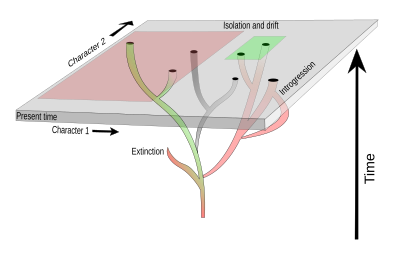
Systematics is the study of the diversification of living forms, both past and present, and the relationships among living things through time. Relationships are visualized as evolutionary trees (synonyms: phylogenetic trees, phylogenies). Phylogenies have two components: branching order (showing group relationships, graphically represented in cladograms) and branch length (showing amount of evolution). Phylogenetic trees of species and higher taxa are used to study the evolution of traits (e.g., anatomical or molecular characteristics) and the distribution of organisms (biogeography). Systematics, in other words, is used to understand the evolutionary history of life on Earth.
The word systematics is derived from the Latin word of Ancient Greek origin systema, which means systematic arrangement of organisms. Carl Linnaeus used 'Systema Naturae' as the title of his book.